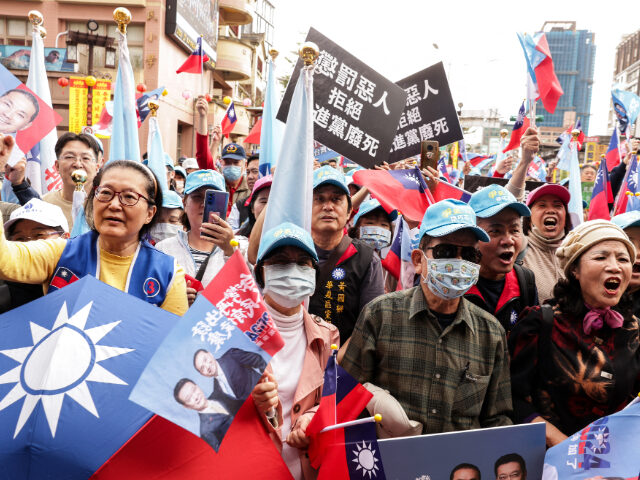Taiwan’s front-running presidential candidate, William Lai Ching-te, said Tuesday that China is resorting to “unprecedented” levels of interference in Saturday’s general election.
Lai is the candidate of the Democratic Progressive Party (DPP) and would-be successor to President Tsai Ing-wen, who is loathed as a “separationist” by Beijing.
“In addition to political and military pressure, it is also using economic means, cognitive warfare, disinformation, threats and incentives. It has resorted to all means to interfere with this election,” Lai said of China’s election meddling.
The UK Guardian quoted international analysts who agreed China is throwing everything it has at Taiwan’s election, from disinformation campaigns to “gray zone” psychological warfare — such as the flotilla of suspicious Chinese balloons that has lately been drifting over Taiwan Island — and outright threats that are not concealed at all.
Taiwanese Foreign Minister Joseph Wu said on Tuesday that China has the same basic objective as usual, namely to “influence a critical minority in a tight race,” but this time around, Beijing seems most interested in playing up divisions within the Taiwanese public to create an atmosphere of distrust and resentment.
Lead researcher Tim Niven of Doublethink Lab said China shifted tactics away from blunt efforts at intimidation and crude subversion, perhaps concerned that Taiwanese voters would resent such heavy-handed bullying and rally around the candidates China does not want them to support.
Instead, the Chinese are putting a great deal of effort into swarming Taiwanese social media with agents and amplifying “pro-China material produced in Taiwan.” China’s objective, according to Niven, is to put “the polarization of Taiwan on steroids.”
Even the fishy Chinese weather balloons floating into Taiwan’s airspace could be an effort to goad Tsai’s outgoing government into overreacting, which could alienate Taiwanese voters who worry about the DPP provoking China too much.
“Is this really cognitive warfare on China’s part? They’re not the ones announcing the balloons. If Taiwan’s government wasn’t announcing them, it wouldn’t be a very effective campaign on China’s part if no one knew they were there,” mused National University of Singapore senior fellow Drew Thompson.
Thompson noted there was really no good reason why Chinese balloons would suddenly be flying over Taiwan a few days before a major election, and the Chinese have scarcely bothered to explain or justify their presence. Instead, China waits for Taiwanese officials to complain, then lambastes them as “hysterical.”
Not all of China’s interference in the 2024 Taiwan election is a subtle game of shadows. China has framed the election as a “choice between war and peace,” promised economic incentives if Taiwan votes the way Beijing wants, and ominously suggested “reunification” is inevitable, so the Taiwanese should stop resisting it.
Channel News Asia (CNA) noted on Monday that a growing number of Taiwanese have stopped thinking of themselves as “Chinese” over the past thirty years, a generational shift that suggests the population does not think of “reunification” as inevitable. Even pro-China candidates have adjusted their election campaigns to acknowledge that Taiwanese voters who desire better relations with China still think of themselves as Taiwanese.
The latest annual survey from the Election Study Center at Taiwan’s National Chengchi University found more than 62 percent of adults identify as Taiwanese, versus only 2.5 percent who identify as Chinese and 30 percent who see themselves as a mixture of both.
Poll analysts said the 30 percent who identify as “both” tend to view themselves as members of a unique culture that “succeeded” China, so they still have a strong sense of unique national identity.
Another recent university poll found that 80 percent of Taiwanese students saw themselves as purely Taiwanese. This seems to be partly a natural consequence of the older Taiwanese generation that was largely born in China passing on, so a dwindling number of modern Taiwanese have parents or grandparents who were born in China.
There have also been a few generation-defining incidents that sparked surges of Taiwanese identity, including the island’s full embrace of democratic elections in 1996. The most recent flourishing of Taiwanese identity came ironically at the hands of Chinese dictator Xi Jinping, whose brutal crackdown on the Hong Kong pro-democracy movement of 2019 soured many Taiwanese on the notion of accepting a similar “limited autonomy” deal to reunify with the Chinese Communist government.
Lai on Tuesday predicted the strength of Taiwanese identity would inspire voters to see through Beijing’s attempts to muddle the election. He mentioned the example of Hong Kong as a reason why the people of Taiwan will refuse to vote the way Beijing wants them to.
“In this election, China uses an argument of choosing between peace over war, trying to establish a pro-China government,” he said. “But the people of Taiwan have realized this and will use their sacred vote to carry out democracy, because otherwise … it won’t be a presidential election, it will be for an election for a provincial head, like Hong Kong.”

COMMENTS
Please let us know if you're having issues with commenting.